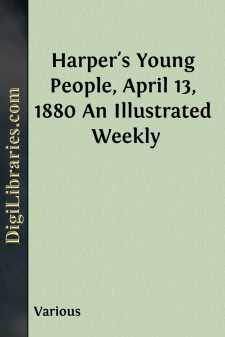Categories
- Antiques & Collectibles 13
- Architecture 36
- Art 48
- Bibles 22
- Biography & Autobiography 814
- Body, Mind & Spirit 145
- Business & Economics 28
- Children's Books 17
- Children's Fiction 14
- Computers 4
- Cooking 94
- Crafts & Hobbies 4
- Drama 346
- Education 58
- Family & Relationships 59
- Fiction 11834
- Foreign Language Study 3
- Games 19
- Gardening 17
- Health & Fitness 34
- History 1378
- House & Home 1
- Humor 147
- Juvenile Fiction 1873
- Juvenile Nonfiction 202
- Language Arts & Disciplines 89
- Law 16
- Literary Collections 686
- Literary Criticism 179
- Mathematics 13
- Medical 41
- Music 40
- Nature 179
- Non-Classifiable 1768
- Performing Arts 7
- Periodicals 1453
- Philosophy 66
- Photography 2
- Poetry 897
- Political Science 203
- Psychology 45
- Reference 154
- Religion 516
- Science 126
- Self-Help 85
- Social Science 82
- Sports & Recreation 34
- Study Aids 3
- Technology & Engineering 59
- Transportation 23
- Travel 463
- True Crime 29
Our website is made possible by displaying online advertisements to our visitors.
Please consider supporting us by disabling your ad blocker.
Harper's Young People, April 13, 1880 An Illustrated Weekly
by: Various
Categories:
Description:
Excerpt
NANCY HANSON'S PROJECT.
BY HOWARD PYLE.
It was in the old Quaker town of Wilmington, Delaware, and it was the evening of the day on which the battle of Brandywine had been fought. The country people were coming into town in sledges, and in heavy low carts with solid wheels made of slices from great tree trunks, loaded with butter, eggs, milk, and vegetables; for the following day was market-day. Market-day came every Fourth-day (Wednesday) and every Seventh-day (Saturday). Then the carts drew up in a long line in Market Street, with their tail-boards to the sidewalk, and the farmers sold their produce to the town people, who jostled each other as they walked up and down in front of the market carts—a custom of street markets still carried on in Wilmington.
Friend William Stapler stopped, on his way to market in his cart, at Elizabeth Hanson's house, in Shipley Street, to leave a dozen eggs and two pounds of butter, as he did each Tuesday and Friday evening. Elizabeth came to the door with a basket for half a peck of potatoes. William Stapler took off his broad-brimmed hat, and slowly rubbed his horny hand over his short-cut, stubbly gray hair.
"Ah! I tell thee, Lizabeth, they're a-doin' great things up above Chadd's Ford. I hearn th' canning a-boomin' away all day to-day. Ah, Lizabeth, the world's people is a wicked people. They spare not the brother's blood when th' Adam is aroused within them. They stan' in slippery places, Lizabeth."
"Does thee think they're fighting, William?"
"Truly I think they are. Ah! I tell thee, Lizabeth, they're differen' 'n when I was young. Then we only feared the Injuns, 'n' now it's white men agin white men. They tuck eight young turkeys of mine, 'n' only paid me ten shillin' fer 'em."
"But, oh, William, I do hope they're not fighting! I expect my son-in-law, Captain William Bellach, and his friend Colonel Tilton, will stop here on their way to join General Washington; and they may arrive to-night."
"Ah, Lizabeth, I've lifted up my voice in testimony agin the young men goin' to the wars an' sheddin' blood. 'F a man diggeth a pit an' falleth into it himself, who shall help him out thereof? Half a peck o' potatoes, did thee say, Lizabeth?"
During the evening rumors became more exciting, and it was said that the Americans had been defeated, and were retreating toward Philadelphia. Late that night Captain Bellach and Colonel Tilton arrived at Elizabeth Hanson's house.
"I've heard the rumors, mother," said Captain Bellach. "I don't believe 'em; but even if there was a file of British at the door here, I would be too tired to run away from them."
Pretty Nancy Hanson spoke up. "But, Billy, they would not only send thee and thy friend to the hulks if they caught thee, but they might be rude to us women were they to find thee here."
"Yes, sister-in-law, if I thought there was any danger, I would leave instantly; but the British, even if they have beaten us, will be too tired to come here to-night."
"I agree with my friend Will, Mistress Nancy," said Colonel Tilton....












